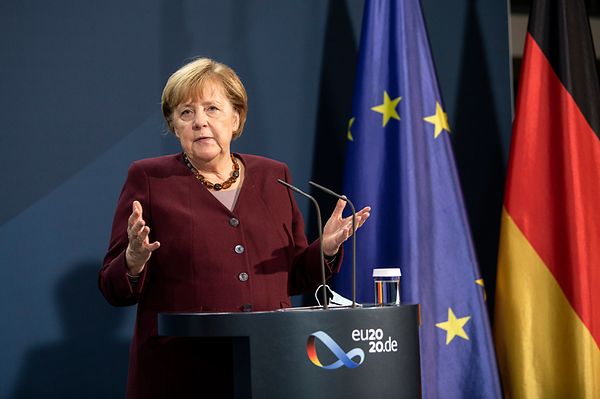Because in Germany for CDU-Csu the after Merkel is complicated

The outcome of the vote in Rhineland-Palatinate, where the voters confirmed a “traffic light” majority (with the colors of the SPD, green and liberal) shows that an alternative without CDU-CSU is possible. It is theoretically so also in Baden-Württemberg. The insight of Mennitti from Berlin
The first elections in Germany at the time of the pandemic, in the two western Länder of Baden-Württemberg and Rhineland-Palatinate, rewarded the outgoing regional presidents and marked a severe defeat for Armin Laschet's CDU. The Greens won in Stuttgart, where Winfried Kretschmann confirmed himself as president with 32%. The SPD wins in Mainz, with Malu Dreyer reaching 35.7, percentages that the Social Democrats can only dream of at national level.
In both Länder, Armin Laschet's new CDU hits the worst results in its history: 23.5% in Baden-Württemberg, an unassailable stronghold of the party for decades, 26.6% in Rhineland-Palatinate, Helmut Kohl's native region . The decrease compared to the previous elections was respectively 3 and 5%. If on the one hand the local Christian-Democratic leaders complain that the electoral campaign numbed by the pandemic has favored the notoriety of the presidents in office, on the other it should be highlighted how the massive vote by mail (precisely for fear of contagions in the voting booth) has minimized the negative impact of the scandals of CDU parliamentarians, which broke out only in the last week. It was a real "home voting", with 50% of voters in Baden-Württemberg and 65% in Rhineland-Palatinate casting their vote by post, well before the mask commission scandals broke out . In short, it could have been worse. The expert on electoral flows of public TV Ard estimates the decline of the party in the polls close to the vote at around a further 2%.
But beyond the regional specificities and the popularity of outgoing presidents, the result is bound to have strong repercussions in Berlin, where conservatives are grappling with the crux of the candidate for chancellery. Armin Laschet has only taken over the CDU since January, but it was inevitable that this first electoral appointment would have influenced the duel with Markus Söder, the leader of the Bavarian sister party CSU.
No honeymoon between the voters and the new CDU leadership, and moreover the party is losing the consent for the management of the pandemic after the errors in the second wave and the false start of the vaccination campaign. A change of mood that primarily affects the Chancellor and the Minister of Health Jeans Spahn, praised only a few months earlier, and which affects the entire party: the national polls went from 40% last May to 31 % these days. After the pandemic bubble deflate, the party has returned to the difficulties of a year ago, with a chancellor (now in difficulty) with suitcases in hand and a leadership that is struggling to find authority and credibility.
Thus the double whammy of Stuttgart and Mainz weighs down Laschet's wings and feeds Söder's ambitions, to which the Germans in the polls attribute greater leadership skills, also thanks to the feeling that he is facing the Covid crisis with greater energy (the second is president of Bavaria, the first in North Rhine-Westphalia). Laschet is bruised but not yet out of the game: but he needs a kidney shot if he still wants to maintain the priority that the greater importance of the CDU over the CSU reserves for him. The duel for the candidacy has so far been underground, in the next few days it will emerge on the surface: now there are only six months left for the federal vote (26 September) and the candidate of the Social Democrats has already been in the field for some time.
The second national reflex concerns future government alliances. The scenarios that may emerge will depend a lot on the reaction capacity of CDU and CSU. There are many open fronts: in addition to the choice of the candidate for chancellor, the reaction to the scandals of the parliamentarians, the definition of a strong profile for the post-Merkel, the presentation of a clear and innovative electoral program and of course a more efficient management of the pandemic by the government in office, starting with the vaccination campaign, slowly due to the scarcity of doses but also due to bureaucratic delays in bookings and administrations. Especially since there is the now inevitable third wave of infections to be addressed.
With six months of pandemic still ahead, even the inevitability of a black-green government may waver. The outcome of Rhineland-Palatinate, where the voters confirmed a “traffic light” majority (with the colors of the SPD, green and liberal) shows that an alternative without CDU-CSU is possible. It is theoretically so also in Baden-Württemberg, where the two government options (the outgoing green-black one and the “traffic light” one) would be based on almost the same number of seats. According to polls, at the moment this possibility is numerically excluded at the federal level, but if the Conservatives fail to reverse the course, they could find themselves in September without the ball in their hands. Fantapolitica, but we live in extraordinary times. Then the greens would be the tip of the balance and they would be the ones to decide with whom to govern. And if they come second behind the CDU, they could be tempted by the idea of forming a government with the other parties by designating the first environmental chancellor of the Bundesrepublik.
This is a machine translation from Italian language of a post published on Start Magazine at the URL https://www.startmag.it/mondo/perche-in-germania-per-cdu-csu-si-complica-il-dopo-merkel/ on Mon, 15 Mar 2021 05:36:50 +0000.
